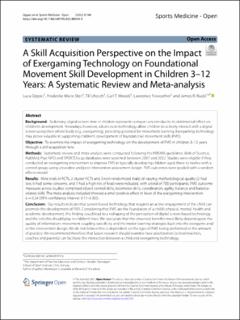| dc.contributor.author | Oppici, Luca | |
| dc.contributor.author | Stell, Frederike Marie | |
| dc.contributor.author | Utesch, Till | |
| dc.contributor.author | Woods, Carl T. | |
| dc.contributor.author | Foweather, Lawrence | |
| dc.contributor.author | Rudd, James Robert | |
| dc.date.accessioned | 2023-03-02T13:49:23Z | |
| dc.date.available | 2023-03-02T13:49:23Z | |
| dc.date.created | 2023-01-04T08:51:40Z | |
| dc.date.issued | 2022 | |
| dc.identifier.citation | Sports Medicine - Open. 2022, 8(2022), Artikkel 148. | en_US |
| dc.identifier.issn | 2198-9761 | |
| dc.identifier.uri | https://hdl.handle.net/11250/3055435 | |
| dc.description | This article is licensed under a Creative Commons Attribution 4.0 International License, which permits use, sharing, adaptation, distribution and reproduction in any medium or format, as long as you give appropriate credit to the original author(s) and the source, provide a link to the Creative Commons licence, and indicate if changes were made. The images or other third party material in this article are included in the article's Creative Commons licence, unless indicated otherwise in a credit line to the material. If material is not included in the article's Creative Commons licence and your intended use is not permitted by statutory regulation or exceeds the permitted use, you will need to obtain permission directly from the copyright holder. | en_US |
| dc.description.abstract | Background: Sedentary, digital screen time in children represents a major concern due to its detrimental effect on children’s development. Nowadays, however, advances in technology allow children to actively interact with a digital screen using their whole body (e.g., exergaming), providing potential for movement learning. Exergaming technology may prove valuable in supporting children’s development of foundational movement skills (FMS).
Objective: To examine the impact of exergaming technology on the development of FMS in children 3–12 years through a skill acquisition lens.
Methods: Systematic review and meta-analysis were conducted following the PRISMA guidelines. Web of Science, PubMed, PsycINFO and SPORTDiscus databases were searched between 2007 and 2022. Studies were eligible if they conducted an exergaming intervention to improve FMS in typically developing children aged three to twelve with a control group, using a baseline and post-intervention assessment design. FMS outcomes were pooled with a random effects model.
Results: Nine trials (4 RCTs, 2 cluster RCTs and 3 non-randomized trials) of varying methodological quality (2 had low, 6 had some concerns, and 1 had a high risk of bias) were included, with a total of 783 participants. FMS outcome measures across studies comprised object control skills, locomotor skills, coordination, agility, balance and balance-related skills. The meta-analysis included showed a small positive effect in favor of the exergaming intervention (r = 0.24 [95% confidence interval: 0.11–0.36]).
Conclusion: Our results indicate that screen-based technology that requires an active engagement of the child can promote the development of FMS. Considering that FMS are the foundation of a child’s physical, mental, health and academic development, this finding could lead to a reshaping of the perception of digital screen-based technology and the role this should play in children’s lives. We speculate that the observed benefits most likely depend upon the quality of information–movement coupling specificity and the motor learning strategies built into the exergame and/or the intervention design. We do not believe this is dependent on the type of FMS being performed or the amount of practice. We recommend therefore that future research should examine how practitioners (school teachers, coaches and parents) can facilitate the interaction between a child and exergaming technology. | en_US |
| dc.language.iso | eng | en_US |
| dc.subject | exergaming | en_US |
| dc.subject | foundational movement skills | en_US |
| dc.subject | fundamental movement skills | en_US |
| dc.subject | motor competence | en_US |
| dc.subject | skill acquisition | en_US |
| dc.subject | technology | en_US |
| dc.title | A skill acquisition perspective on the impact of exergaming technology on foundational movement skill development in children 3–12 years: A systematic review and meta-analysis | en_US |
| dc.type | Peer reviewed | en_US |
| dc.type | Journal article | en_US |
| dc.description.version | publishedVersion | en_US |
| dc.rights.holder | © The Author(s) 2022 | en_US |
| dc.source.pagenumber | 15 | en_US |
| dc.source.volume | 8 | en_US |
| dc.source.journal | Sports Medicine - Open | en_US |
| dc.identifier.doi | 10.1186/s40798-022-00534-8 | |
| dc.identifier.cristin | 2100122 | |
| dc.description.localcode | Institutt for lærerutdanning og friluftslivsstudier / Department of Teacher Education and Outdoor Studies | en_US |
| dc.source.articlenumber | 148 | en_US |
| cristin.ispublished | true | |
| cristin.fulltext | original | |
| cristin.qualitycode | 1 | |
